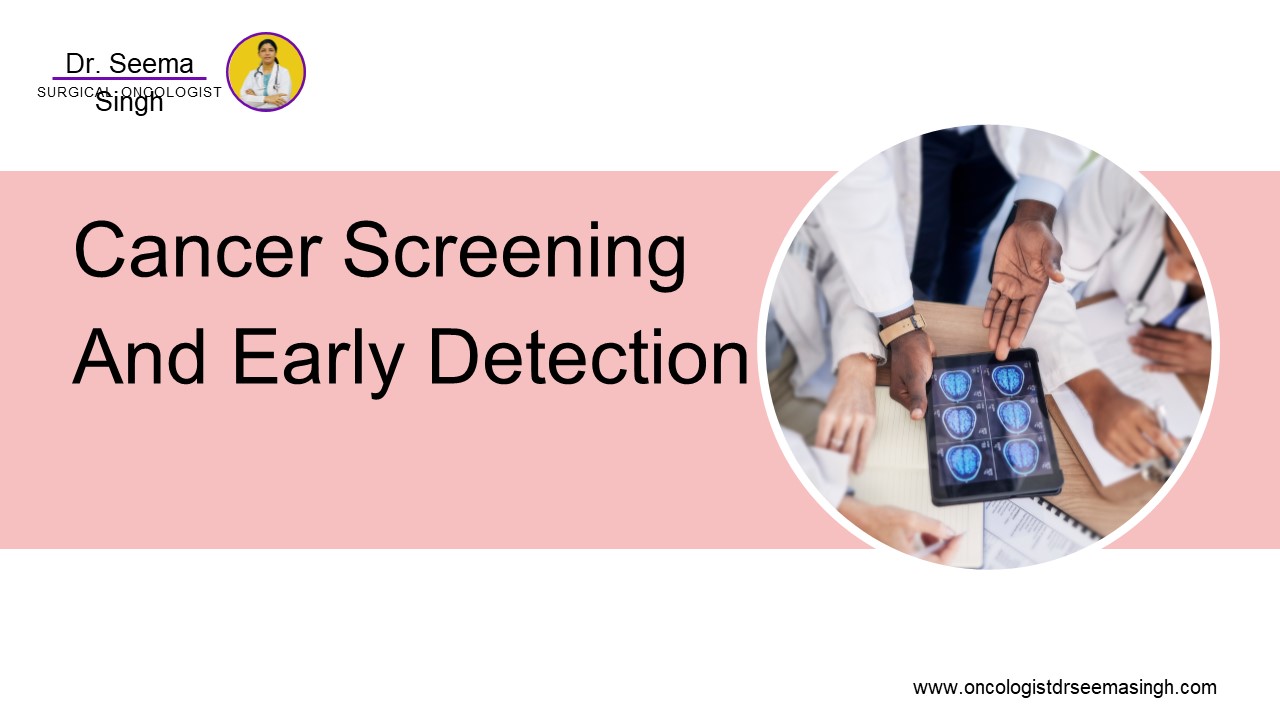Cancer Screening And Early Detection - PowerPoint PPT Presentation
Title:
Cancer Screening And Early Detection
Description:
Cancer screening means taking tests to look for signs of cancer even if you feel fine. Research shows that some of these tests can find cancer in its early stages, when it’s easier to treat and maybe even cure. However, it’s important to know that these tests can’t tell you for sure if you have cancer. They’re a way to see if you might have cancer cells or early signs of it. – PowerPoint PPT presentation
Number of Views:2
Title: Cancer Screening And Early Detection
1
Cancer Screening And Early Detection
www.oncologistdrseemasingh.com
2
Introduction
Cancer screening means taking tests to look for
signs of cancer even if you feel fine. Research
shows that some of these tests can find cancer in
its early stages when its easier to treat and
maybe even cure. However, its important to know
that these tests cant tell you for sure if you
have cancer. Theyre a way to see if you might
have cancer cells or early signs of it.
3
What is Cancer Screening?
Cancer screening means getting tests to check for
signs of cancer before you feel sick. Research
shows that certain tests can discover cancer when
its in the early stage, making it easier to
treat and maybe even cure. If your doctor
suggests a screening test, it doesnt necessarily
mean they think you have cancer. Most people
typically start these tests in their 40s, but if
youre at a higher risk of cancer, your doctor
might recommend them earlier. If you believe
youre at risk for cancer, its a good idea to
talk to a healthcare provider about these
screening tests.
4
Benefits of Cancer Screening Test
- Cancer screening can detect changes in your body
that have the potential to develop into cancer. - Screening tests identify cancer at an early
stage, often before any symptoms appear. - Screening tests can help in finding cancer before
it has a chance to spread. - Disadvantages of cancer screening Test
- Cancer screening tests are not always reliable.
Sometimes, they may indicate that you have cancer
when you dont, which is called a false-positive
result. - Sometimes, the test might suggest that you dont
have cancer when you actually do, which is known
as a false-negative result.
5
Who Should Get Cancer Screenings?
The guidelines for cancer screening depend on the
type of cancer and your personal circumstances.
If youre 20 years or older, its a good idea to
discuss with a healthcare provider whether you
should undergo cancer-related checkups. During
these checkups, healthcare providers assess your
risk factors for cancer, which are things that
increase your chances of developing it. A family
history of cancer is one such risk
factor. Typically, most people do not need
regular cancer screening tests until they reach
their 40s. However, there are exceptions,
including situations where youve been diagnosed
with a pre-cancerous condition or if theres a
family history of cancer, especially if younger
family members have been diagnosed with it.
6
What Are Common Cancer Screening Tests?
Cancer screening involves several types of tests,
including physical examinations, imaging tests,
and laboratory tests. Physical Examination
During a routine physical, a healthcare provider
may examine your body for any unusual changes,
such as abnormal lumps. They will also inquire
about your health habits and your familys
medical history. Laboratory Tests These tests
can encompass blood tests for cancer markers,
procedures to collect tissue samples and urine
tests. Pap smears, for example, involve
collecting tissue for examination by medical
pathologists to detect signs of cancer. Imaging
Tests These tests generate images of the inside
of your body. For instance, a mammogram is an
imaging test used to screen for breast
cancer. Genetic Tests for Cancer If a family
member has a hereditary form of cancer, your
healthcare provider might recommend genetic tests
to determine if you have an increased risk of
developing that specific type of cancer.
7
What Does a Cancer Screening Test Result Mean?
Cancer screening tests are designed to detect
changes in your body that could be early signs of
cancer. However, its crucial to understand that
the test result is not a definitive cancer
diagnosis, nor does it guarantee that you are
cancer-free. Sometimes, these screening tests may
indicate unusual results or changes in your body.
In such cases, your healthcare provider might
recommend further tests. Its essential to note
that undergoing additional tests doesnt
automatically mean you have cancer.
8
What Happens if Screening Test Shows Signs of
Cancer?
Its important to recognize that a screening test
is not a conclusive diagnostic tool. If your
screening test results suggest signs of cancer,
your healthcare provider will likely conduct more
tests to gather additional information about the
changes in your body. Similarly, a screening test
that doesnt find signs of cancer doesnt
necessarily mean you are entirely healthy. Cancer
often starts small and may grow slowly over time.
To determine when you should have another
screening test, consult with your healthcare
provider.
9
Schedule Your Cancer Screening Test Today
You can take a crucial step towards your
well-being by scheduling a cancer screening test
with Dr. Seema Singh, a seasoned Cancer
specialist. Conveniently located at Yashoda Super
Speciality Hospitals in Kaushambi, you have
access to expert care. Dr. Seema Singhs Cancer
OPD operates from Monday to Saturday, ensuring
flexibility in appointment times from 9 am to 5
pm. Prioritize your health and book your
screening test today. Early detection can make
all the difference.
10
Thank You
Dr. Seema Singh
MS, MCh Surgical Oncology ( AIIMS)
YASHODA SUPER SPECIALITY HOSPITAL Kaushambi
Ghaziabad
www.oncologistdrseemasingh.com
91-9911347475
Book an Appointment






















![Cancer 101: A Cancer Education and Training Program for [Target Population] PowerPoint PPT Presentation](https://s3.amazonaws.com/images.powershow.com/4345030.th0.jpg?_=202009170610)








